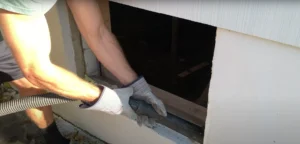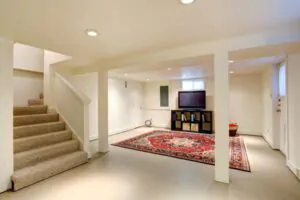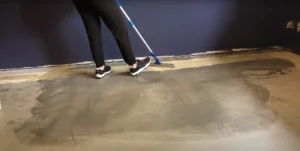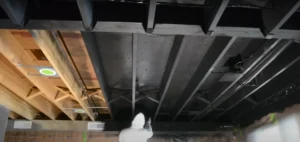Are you considering finishing your basement and wondering if it will truly add value to your home? Many homeowners face this dilemma, trying to determine if the investment in a finished basement will pay off when it’s time to sell.
The idea of transforming an unused space into something functional and appealing is tempting, but its impact on home value can be uncertain.
One interesting fact is that while finished basements can indeed add value, they are generally not as valuable as main-floor living spaces or above-grade bedrooms. But don’t let that discourage you! There are clear benefits to finishing your basement beyond just increasing market value.
In this article, we’ll explore both the financial and practical aspects of finishing a basement. We’ll discuss how it enhances additional living space, impacts energy efficiency, and affects return on investment (ROI).
Read on for insights that could help you make an informed decision.
Key Takeaways
- Finishing a basement can increase your home’s value by offering additional usable space, with an average ROI of 86% based on the $57,500 average cost in 2022.
- High-quality finishes and compliance with building codes significantly boost the appeal and value of a finished basement.
- Local housing market trends greatly affect the added value; places like the Pacific region see an ROI of up to 86.4%, while New England sees about 52.8%.
- Types of finished basements—walk-out, standard lot, and garden-level—vary in appeal and impact on resale value.
- Insulating a finished basement enhances energy efficiency, leading to lower heating and cooling bills year-round.
Benefits of Finishing Your Basement
Finished basements can make your home more appealing to buyers. They offer extra space for a variety of uses, like a home office or an entertainment room.
Increased Home Value
Upgrading a basement can increase your home’s value by offering additional usable space. Homebuyers often appreciate having extra rooms for activities like a home office or an apartment, which makes the property more attractive on the market.
Research from 2022 shows finishing a basement costs around $57,500 in the U.S., with an average ROI of 86%. This means homeowners can recover about $49,250 through increased appraisal value.
Basement renovations also add to the overall price per square foot, contributing significantly to a higher resale value. Although less valuable than main-floor living spaces and above-grade bedrooms, finished basements still provide substantial financial benefits.
Features like recessed lighting, quality flooring materials, and proper compliance with building codes enhance curb appeal and attract potential buyers.
Additional Living Space
Transforming a basement into additional living space opens up numerous possibilities for any household. Consider creating a cozy family room, an entertainment hub, or an extra bedroom that can accommodate guests.
According to the Zillow Group Consumer Housing Trends Report 2018, 60% of buyers find a spare/guest bedroom extremely important. This makes adding one in the basement not just practical but appealing to potential future buyers.
Moreover, integrating features like natural light through egress windows enhances the living atmosphere while meeting safety standards. Although installing an egress window ranges from $3,000 to $7,000, it’s a worthy investment for both comfort and compliance with building codes.
A well-designed stairway leading down can also significantly impact accessibility and flow between floors.
A finished basement as additional living space is a win-win, says a local real estate agent. It adds value while providing immediate functional benefits.
Converting your basement taps into underutilized square footage without expanding your home’s footprint on your lot—ideal for urban areas where land is at a premium. Whether it’s setting up a game room complete with entertainment systems or building out storage solutions around existing infrastructure like the furnace, the options are vast and customizable to fit different needs and styles.
Enhanced Energy Efficiency
Insulating a finished basement plays a major role in enhancing energy efficiency. Well-installed insulation prevents heat from escaping during the winter and keeps cool air inside during the summer.
This means families can enjoy lower heating and cooling bills throughout the year.
Properly finishing your basement helps create a more airtight space, reducing drafts and temperature fluctuations. This makes it easier to maintain a comfortable environment regardless of outside weather conditions.
Investing in these measures improves comfort and adds value when you decide to sell your home on the real estate market.
Key Factors Impacting Value Addition
Local housing trends can impact how much a finished basement adds to your home’s value. High-quality finishes and adherence to building codes also play significant roles in determining the overall increase in worth.
Local Market Conditions
Understanding local market conditions is key when considering the investment in a finished basement. In some areas, such as the Pacific region, homeowners can expect to see a high return on investment (ROI) of 86.4%.
This means that finishing your basement could significantly increase your home’s value there. On the other hand, New England sees lower ROI rates at around 52.8%, suggesting that the same renovation might not be as lucrative.
Real estate agents play an essential role in assessing how much value a finished basement could add to your home based on prices of comparable homes in your area. These professionals use tools like cost vs.
value reports and data from organizations like The National Association of Realtors to provide accurate insights specific to locales. Since market conditions vary widely across different regions, consulting with an experienced real estate agent helps align expectations with reality and ensures you make informed decisions about upgrading or renovating your basement.
Quality of Finishes
Quality finishes can significantly boost the appeal and perceived value of a finished basement. Flooring options like high-quality carpet, durable carpet tiles, or luxury vinyl not only enhance comfort but also add an elegant touch.
Lighting plays a crucial role too; prioritizing natural light along with modern lighting solutions can make even the darkest spaces feel inviting.
Basement finishes should match the rest of your home in style, look, and quality to create a seamless transition from one level to another. Paying close attention to detail ensures that every element feels cohesive and well-thought-out.
Investing in superior materials may involve higher initial expenses but often results in greater long-term profit when selling your house.
Compliance with Building Codes
Local laws and permits are essential for basement finishing projects. Non-compliance with building codes can decrease property value and lead to legal troubles. Building code violations can impact a seller’s ability to sell or rent out the property.
Ensuring that your basement ceiling is at least 7 feet tall is crucial, as it meets safety standards.
Ignoring compliance can cause significant issues later on. Buyers may hesitate if they discover unapproved modifications during inspections. Potential fines from local authorities add another layer of risk.
For peace of mind, always adhere strictly to building codes in remodeling ventures like a walk-out basement project.
Types of Finished Basements
Finished basements vary based on their design, accessibility, and natural light availability.
Walk-out Basement
Walk-out basements are highly desirable because they offer natural light and outdoor access. This makes the space feel more like an extension of the main house rather than a typical basement.
Families enjoy having direct access to their backyard, which is especially convenient for homes in regions like West South Central.
These basements can significantly increase your home’s value. They often add 50% to 100% of above-ground living space value. To maximize ROI, ensure finishes match the rest of your home in style and quality.
Using high-quality materials ensures that potential buyers see it as a seamless part of the entire property.
The walkout feature adds both practical and aesthetic appeal. With stairs leading directly to ground level, you avoid feeling confined underground. This type of layout also opens up possibilities for additional uses, such as rental units or guest suites, making it even more versatile and valuable.
Standard Lot Basement
A standard lot basement is typically underground and receives minimal natural light. These spaces often feel more enclosed due to the lack of windows and daylight. Many homeowners aim to finish these basements by following local building codes, which call for at least 7-foot ceilings.
The process usually requires obtaining permits, making sure that all renovations comply with city regulations.
Though a finished standard lot basement can add valuable living space, it tends to be less attractive to buyers compared to above-ground options like walkout basements. This difference in appeal impacts resale value negatively.
Upgrading this type of basement also poses challenges in creating a comfortable environment without natural light. However, strategic lighting solutions and high-quality finishes can help make the space more welcoming and functional.
Garden-level Lot Basement
Garden-level basements sit partially above and below ground, allowing for some natural light through larger windows. These spaces often feature bigger window wells compared to fully underground basements, making them brighter and more inviting.
As basement remodeling gains popularity, garden-level basements offer a good middle-ground solution for families who prefer some daylight without the cost of constructing a full walk-out basement.
In terms of home value, appraisers prioritize above-ground living spaces over below-ground areas, but garden-level basements still add significant worth due to their enhanced livability.
Though less desirable than walk-out options, these basements are easier to waterproof and can be finished with quality materials that comply with building codes. Adding features like proper insulation and energy-efficient windows can also boost this space’s appeal while helping hedge against high utility costs by improving overall energy efficiency in your home.
Cost vs. ROI Analysis
Calculating the cost versus ROI is crucial for anyone considering a basement renovation. Initial expenses can vary widely based on materials and labor, but they often lead to increased property value over time.
Initial Investment Costs
The initial investment costs for finishing a basement can be significant. On average, the cost of completing a basement in the US in 2022 was $57,500. This number can vary based on factors such as size, design choices, and existing conditions of your space.
You might also need to create new stairs for the basement. Setting up new stairways typically ranges from $1,000 to $3,000.
Adding an egress window is another crucial expenditure that ensures safety and complies with building codes. The cost for installing an egress window runs between $3,000 and $7,000.
Furthermore, Remodeling Magazine’s Cost vs Value Report found a mid-range basement remodel costing around $71,115 nationally in 2017. Every inclusion or change you make will impact both your budget now and potential returns later on.
Expected Return on Investment by Region
Expected return on investment (ROI) for finished basements varies widely across different regions in the United States. The Pacific region leads with an impressive ROI of 86.4%. Homeowners there can expect a significant boost in home value after finishing their basements.
In contrast, New England has the lowest ROI at 52.8%, meaning homeowners might see a smaller increase in value compared to other areas.
Nationwide, Remodeling magazine’s Cost vs. Value Report from 2017 highlights that the average amount recouped at resale is $49,768, which translates to roughly 70% of the initial investment.
On average, finishing a basement costs around $57,500 as cited in 2022 statistics. This results in an estimated cost recovery of $49,250 and an overall average ROI close to 86%. For families looking to upgrade or waterproof their ground floor space, these figures are essential for calculating potential returns based on regional data.
Conclusion
Finished basements can add value to your home but require careful planning. They offer additional living space and can improve energy efficiency. Whether they significantly boost property value depends on factors like market conditions and the quality of finishes.
FAQs
1. Do finished basements add value to your home?
Yes, a finished basement can increase the value of your home by providing extra living space and improving overall appeal.
2. What are the benefits of finishing a basement?
Finishing a basement offers more usable space for activities like family rooms or guest bedrooms, which can attract potential buyers.
3. How much does it cost to finish a basement?
The cost varies based on size and materials but typically ranges from $10,000 to $30,000.
4. Are there any considerations before finishing a basement?
Ensure proper waterproofing and ventilation to prevent issues like mold growth or moisture damage that could affect property value negatively.





